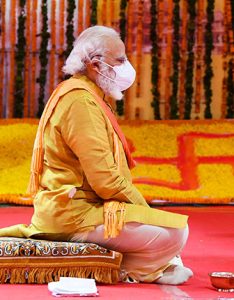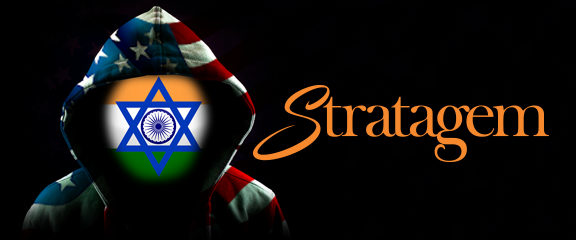We are engaged in back door diplomacy with India simply because they approached us — or so according to the grapevine. Question: Why would they? And another question: why did we even consider this offer? For peace — so that one fifth of humanity inhabiting this region could actually have a fair shot at a reasonable life? For being seen as champions of a noble cause, in line with the good Boy Scout image we are so keen to project? For the hope that the resulting bonhomie from engagement with the neighbour would at some point in the future create an enabling environment, in which the ‘minor irritant’ created by emotional Kashmiri Muslims would take care of itself?
A presumptuous analysis maybe, but given the events recently unfolding in the Indo-Pak arena, not entirely implausible. And so, if this is the case, why not add some more logic to it making this line of argument appear as wholesome as possible. By that line of thought the reasoning would be, we must fix our house first, stabilise politically, sort out the internal economic mess, become a powerhouse or at least work towards it, before we venture out at the subcontinental, and beyond that, the global level and try and get ourselves heard. And let us not forget the rider in this intellectually driven line of thought: Pakistan has become a ”security state” at the cost of its people’s welfare, has fought enough wars to last us a lifetime without achieving anything worthwhile. After all, the establishment rules the roost, when we could instead have had a flourishing democracy, and democracies don’t go to war. The bottom line: if engagement were to prevail, Pakistan and India would become bastions of peace and tranquillity for their people.
So the question arises, how can one speak against such a promising, sweet-sounding objective? I would personally give an arm and a leg just to work for it, never mind the end goal — Utopia.
Unfortunately, history tells us a different story, and nations that forget their past sometimes lose their future. One doesn’t have to look far to see this — Pakistan’s history is a graphic case in point. Deliberate distortions of the genesis of our birth and our history have divided us in every conceivable way, politically, religiously, ethnically, etc., etc. The age of political philosophy is long over, and largely because of that, democracy is in trouble. In short, we are at odds with ourselves, we don’t even have a national denominator, much less a set of nationally agreed-upon policies aimed at achieving national goals. This kind of environment makes it mandatory for those aspiring for a national leadership role to rise above themselves, correct perceptual biases and make a new beginning. What we have instead is a huge mass of bewildered individuals, following anyone who promises them the moon, but delivers absolutely nothing. Look around and see if myopia and selfishness aren’t reigning supreme! Which political force — ‘leader’ or party — today is ready to learn from history and move beyond their specific narrative when no one agrees on our short history? Instead they continue to cite ad nauseam their specific grudges to influence our historical perspective. Making a new beginning takes far more.
Let us examine the issues bedevilling the relationship between Pakistan and India, or better still, what has to be forgotten with a view to making a new beginning.
History tells us that until the Muslims made inroads in India, Brahmin Zionism ruled supreme in almost every nook and corner of the country, regardless of who was the ruler. As the principle of the equality of human beings — one of the pillars of Islam — started taking root, Brahmin Zionism found its stranglehold gradually weakening. The Muslims may have lost sight of this on either side of the border, but the affected party has not forgotten. Doubts, if any, were removed when Modi was brought into power by an extremely strong ‘Hindian’ establishment which comprises big money, and is ruled by even richer Brahmin Zionists. This mindset had unabashedly and repeatedly proclaimed that “Pakistan is an unnatural state. It will wither away on its own, or if not, it will be undone by force.” We got this message immediately after Pakistan appeared on the world map. And this ideology has never changed since then, even when others have been in the driving seat.

Kashmir would have acceded to Pakistan if the rules of the Partition game had been adhered to. Instead, the British for a variety of reasons, none of them well-intentioned, handed it over to India. What if we had not taken back Gilgit-Baltistan and Azad Jammu and Kashmir by force? What if India had not involved the UN Security Council at that point in time, which passed a non-binding resolution promising the Kashmiris the right of self-determination? 70 years later, nothing has, or is ever likely to come out of this sham. Except that it does give us a legitimate reason to support Occupied Kashmir’s cry for self-determination. So do we try and forget this injustice to humanity?
In 1962, Pakistan opted out of the greatest opportunity to address this wrong militarily. We fell for India’s age-old tactics and had six long rounds of talks with them. But Zulfiqar Ali Bhutto’s genius was no match for Sardar Swaran Singh’s wile. America was the architect of this dialogue, but made no effort to make it a result-oriented engagement. The result: zilch, zero. And are we expected to forget this as well?
The 1965 War was followed by the Tashkent Declaration, which didn’t go beyond a ceasefire between the two countries. To this day both continue to claim victory in this conflict. But the fact that Kashmir was the reason for this war is sometimes overlooked.
The 1971 war was a watershed: India achieved the first phase of its declared objective; it cut Pakistan into half, our eastern wing becoming Bangladesh. We may want to forget, but Modi-led India and some of our own political groups repeatedly regurgitate this darkest chapter of our chequered past for their own ends. But perhaps we should remember it, if for no other reason than simply because even half-a-century later, we have failed to arrive at any commonly accepted and agreed-upon reason about what caused it. Not surprising then that we wouldn’t have learnt any lessons from our darkest hour of shame.
The Shimla Accord is perhaps the most misquoted document whenever there’s a chance of raising the Kashmir issue at international forums. Knowingly or otherwise, we have often succumbed to the Indian interpretation that “no issue” between the two countries shall be raised at any international forum. The fact is, the agreement clearly stipulated differently. It spoke volumes about our handling of foreign affairs, particularly with reference to our core issue. And then on August 5, 2019 thanks to the great determination of our Kashmiri brethren, and Modi’s equally determined reaction to it, he changed the status of the disputed region unilaterally. We should have formally declared its demise then, but we didn’t. Why?
Over the years, various efforts by different Pakistani leaders since 1971 to undo the Kashmiri Gordian Knot came to naught, General Pervez Musharraf’s visit to Agra in 2002 being the most prominent amongst them. I was in service then and saw things up close. Two anecdotes in this regard are worth mentioning, because these relate to and might help clarify the general thought process prevailing at that point in time.
First: General Musharraf was quite frustrated after returning empty-handed from Agra. He kept emphasising the fact that an agreement was almost signed, but for Advani’s interference. At one point in the discussion I couldn’t resist the temptation and told him, “Sir, consider yourself lucky that you have returned empty-handed. Otherwise the nation would have torn you apart.”
Second: Later that year I had gone to his office for some official business. As I was leaving, he threw a question at me, “Do you think there can ever be peace between us (Pakistan and India)?” I replied without a moment’s pause, “Never Sir, not even if we were to give up Gilgit- Baltistan and Azad Jammu and Kashmir.” He thought for some time and replied, “I agree with you.” This coming from someone who had put his legacy at stake trying to reach an amicable agreement with India should be reason enough to reconsider our approach. Despite that, his government continued to make determined efforts to sort out different issues with our neighbour in the east. Neither a Hawk Nor a Dove, a wonderful read authored by the then Foreign Minister, Khursheed Mahmud Kasuri, details these efforts at length. But enthusiastic as he was, Mr Kasuri also had to give up when he found that the Indians could talk the Himalayas to a pulp without addressing critical issues seriously.
All this while, Afghanistan continued to be a sharp thorn in our side. Thanks to a very strong Indian presence, it practically attacked Pakistan twice, besides being a general nuisance in different ways. The threat from our western border was so real that until very recently, we had to train and prepare for war on two fronts — India as well as Afghanistan. Not that India has given up its covert war, employing various proxies to conduct it. For example, it has used Afghan soil to launch the most vicious terrorist attacks on our soil, the attack on the Serena Hotel in Quetta on April 21, 2021 being the most recent. China’s Ambassador was the intended target. Luckily, he wasn’t there at that time, but eight innocent Pakistanis did lose their lives.

The purpose of listing the foregoing instances from the past is simply to highlight what is more than abundantly clear. Pakistan has rarely hesitated in engaging with India for the larger good of the region. And it is important to point out that Pakistan has absolutely no ambition beyond ensuring that Kashmiris get what is theirs: their right of self-determination. Giving that up, or even diluting this just demand would be catastrophic. India on the other hand, besides continuously adding to its geographical size — now being 35-40 percent larger than what it was on August 15, 1947 — has declared the aim of becoming a world power. And it has never minced words in this regard, or worked for anything less.
Meanwhile, a certain class of our intellectuals argue that the establishment always comes in the way of Pakistan becoming a welfare state. And, they add, the Indian threat is just a bogey for self-perpetuation. It’s time to put this to rest too.
First, a few questions/observations about the economic price being paid by Pakistan for this “bogey” so to speak:
Was Kashmir or the conflict with Hindia responsible for the derailment of the rapidly progressing industrialisation of the Ayub era?
Who is responsible for our sharp decline in the agriculture sector? Conflict with India?
Did this conflict stymie our Human Resources development, or was that because we were more interested in creating an optical illusion by borrowing heavily, and that too at the highest possible interest rates? This when these projects were neither designed to pay for themselves or break even! The road infrastructure notwithstanding, what else have we done to improve this nation’s economic health?
Did the Kashmiris force us to get Independent Power Plants (IPPs) installed under contracts totally unfavourable to the country? Probably the second biggest heist after privatisation, this “development” continues to bleed us white even 30 odd years later. The highest possible power tariffs, coupled with unimaginative investment policies, have ensured that we don’t go beyond the textile industry. Our foreign and domestic debts have accumulated at such levels that the state has reached insolvency levels. In real terms, we could never get back on the industrialisation track after the privatisation blunder. The IPPs did the rest. And “our mismanagement” has contributed manifold to this state of affairs, which has brought Pakistan to the edge of the steepest possible precipice. That is the harsh reality.
The triangle defined by Wazirabad, Sialkot and Gujranwala is inhabited by very enterprising and imaginative Pakistanis. This region alone has the potential to match the best when it comes to manufacturing. The cottage industry in this region was flourishing beautifully till our decision-makers found out. Sialkot is managing to survive, but the rest now have the appearance of a tsunami-ravaged area. Who is responsible for this?
The destruction of PIA, the Pakistan Railways, Pakistan Steel and the rest of the public sector enterprises is equally painful to consider, this situation too has nothing to do with our conflict with India, or because of our moral or diplomatic support for the Kashmiris. We achieved this downslide all by ourselves
And while we are at it, why not look at our political scene, governance and most important of all, something which affects every aspect of our national life, our constitution and rule of law — our judicial system. The ongoing political instability isn’t due to Kashmir or the conflict with India. Similarly, if we have disfigured our constitution beyond recognition to serve vested political interests, India or Kashmir can’t be held responsible for it. It is time our political mandarins looked at the reality on the ground afresh and came up with a more responsive and dynamic social contract. From actually being good to barely average, and now below average, is how most Pakistanis rate governance in the country. Our judicial system is probably one of the most disappointing aspects of our national life. One finds very few takers for it in its existing form. It is archaic, extremely lethargic, and contradictory in more ways than one, and generally not up to speed with the challenges thrown up by modern society. Its beneficiaries may disagree, but there’s more than a hint of the judicial system having been allowed to deteriorate to this level because it suits the powerful moneyed class. For them, it provides more loopholes than the best of fishing nets.
No doubt we have fought wars for Kashmir and supported them morally and diplomatically all along, but these weren’t by way of favours. Things changed dramatically after 5 August, 2019. Illegally Occupied Kashmir was the biggest military jail even before that, but it has become worse since. Undeterred, for the past two years, Kashmiris have been standing up to the worst possible brutalisation, having been tortured, killed and locked down by over 900,000 Indian troops. They have offered the greatest of sacrifices witnessed by man. In doing so, they have earned the right to call the shots with regard to the future of their state. Make no mistake, the Kashmiris hold the key to the future of the subcontinent, in fact, the world at large.

There are many positives which work in our favour: we are blessed with a nearly ideal geo-strategic location, we grow our own food, around fifty million Pakistanis (more than the population of the Gulf States collectively) can afford a reasonably decent life, and last but not least, we are a credible nuclear power with solid launch systems, and our armed forces are more than a match for our adversaries.
However, unfortunately, when viewed in totality, Pakistan presents a not-so reassuring picture.
All credit to India. It played its card according to a set plan, and can be rightfully proud of its achievements. December 16, 1971 was it first major success. August 5, 2019 was only the second phase of this strategy. It might yield a little to gain some space now that the Indian economy has tanked, because of the devastation caused by COVID-19, growing internal turmoil and constant pressure on its eastern border, but India will come back to its old ways as soon as it gets much needed breathing space.
Look at what India can boast about. To begin with, 90 per cent of its force structure is geared against Pakistan. Besides developing a blue water navy to project its power way beyond its shores, it is in a hurry to upgrade its very large air force, it is a member of the Quadrilateral Security Dialogue (QUAD) with the US, Japan and Australia, and starting with Logistics Exchange Memorandum of Agreement (LEMOA) in September 2016, to the Basic Exchange and Cooperation Agreement (BECA) in November 2020, it has signed five very significant agreements with the US.
So why would India want to talk to Pakistan? And why have we agreed to oblige them?
Whoever heard of successful negotiations from a position of weakness? And when was the last time there was an enduring peace as a consequence of such engagement unless the weaker side was to submit to the demands of the more powerful? What is India bringing to the table? What are we ready to give up as quid pro quo? Who will represent Kashmir and the Kashmiris? Haven’t they made it obvious that both Pakistan and India have to submit to their will now? Nothing else will be acceptable to them, and they have vividly demonstrated the price they are willing to pay. And unless India and Pakistan understand this, both countries run the risk of terrible consequences.

The writer is a prominent defence analyst. During his long and distinguished military career, he held a number of command positions.



